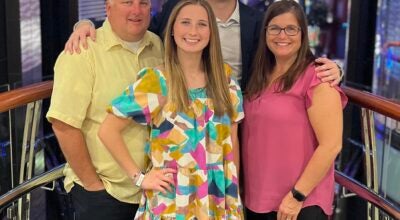New York City native Dorothy Holst worked as policeman
Published 12:00 am Thursday, May 29, 2014
Seventy-nine-year old Dorothy Holst wears a cheerful top to match her bright personality. Her infectious laugh is prevalent throughout our chat. The extra glimmer in Holst’s eyes may allow one to suspect this gal has a bit of giddy-up in her saddle. Does she ever. Holst grew up in New York City. She recalls years ago falling madly in love with her high school sweetheart. “I turned eighteen on June 23rd, graduated on the 25th, and got married on the 28th,” Holst chuckles with a roll of her eyes. The flame between the young couple burned out when they entered the real world. Soon Holst found herself alone with three children and needing money. Raising her three “gifts” with gusto became her mission in life.
For twelve years, Holst worked for AT&T as a switchboard operator. At first, Holst worked as a long distance operator and then as an overseas operator. “That was really interesting for me because I took German and Spanish in high school and I got to practice that. I found a German pen pal on the switchboard. When we were working, we would try to find one another so we could talk,” Holst says. “My pen pal would help me with my German and I would connect her on the phone to talk long distance to her mother. I wasn’t supposed to do that,” Holst laughs. The pen pal soon broke the news to Holst she had married an American soldier and was moving to the United States. “They stopped by my house in New York, so we did meet.”
During the 1950’s in New York, the switchboard was popular, but promoting black women was not. No matter how hard Holst worked, no matter how many languages she could speak, Holst would never be promoted simply because of the color of her skin. “It’s difficult because you are stuck and you can’t go anywhere. There was a union and people started fighting for positions. When I left, they began to give promotions.” Holst chose to leave and join a new fight. The tough woman decided to join the New York Police Department. Was she intimidated to fight crime in New York City? Was she worried about the discrimination she might encounter? “I was angry about not being promoted at my previous job, but I tried to find something to alleviate that because I had three children to take care of. The police department paid more money and was hiring women. I had to take the job to take care of my children.” Holst did encounter more discrimination. Because she was a woman, Holst was called a policewoman, not a police officer. “We would all take the same tests, but in a department of 30,000 men, there were only 250 women. The reason there were fewer women is because they would hire all of the men from the policemen’s list and only hire five or six women from the policewoman’s list.” Once the women were hired, they were separated from the men and would report to the women’s bureau. “We would search any female prisoner that came in or search any dead female. We would also do what they would call, ‘fly.’ When Holst says “fly” she is referring to when the the police would search the dead bodies. They would take off any expensive jewelry off the body because the paramedics or funeral home workers might steal the jewelry.
Holst says another group of women — the police officer’s wives — began to form a union to fight what they believed to be unfair. “They didn’t like that we were riding in the police cars and spending eight hour a day with their husbands.” The policewomen began to form a union of their own. They wanted to be treated just the same as police officers. Soon, equality became inevitable, and it was granted. “The women were better test takers and once they started taking the test for lieutenant and on up, they started climbing the ladder quickly,” Holst says with a prideful giggle. Since the hours in the police department were odd, Holst wanted a job with more normal hours and jumped at a new professional opportunity when it presented itself.
“An opportunity became available to go into the Community Affairs Department and I was a liaison between the community and the police department,” notes Holst. “I worked on the upper west side from west 86th to 110th, street from Central Park West to the river. On 110th street, we had the projects. On 86th street, we had huge apartments. It was our job to keep them calm, and there was a lot of conflict between the two.” At one point, Holst was responding to a robbery and she fell. She injured her back. The police department frowned upon complaints about injuries. “I was out sick once with my injury. They let that slide,” Holst says. “The second time I called out with my injury, they began to start the process to retire me early. We had to work twenty years for retirement, and I retired at fifteen.”
While Holst chose to serve and protect for many years, the police department served her well in her love life. She found a police officer she married after her children graduated from high school. It was her husband who said he wanted to retire in North Carolina to play golf. “My husband was a golf nut. At first, I told him I couldn’t leave all my babies in New York. But I couldn’t live in New York now anyway. I’ve adjusted to the slower pace of life here and maybe that’s why I’ve lived longer,” Holst giggles. Or maybe it is Holst’s way of life, although, she has had reasons to climb into a dark hole and never return. For instance, when her husband died. Or when Holst did something a mother should never have to do — bury her adult son. About the past and all she has endured, Holst says she is not bitter, but glad at how things turned out. She said she is very thankful for the life she has today because of it.
Holst consistently keeps taking life one stride at a time. Two years ago she picked up playing the piano. She works out at the YMCA, tutors for the Augustine Program, and volunteers at the food pantry. Plus, Holst enjoys reading and traveling. Holst just came back from her first mission trip. She was in Costa Rica doing daily manual labor. “They call me the traveling Granny,” Holst says about her family. “The good Lord has been good to me. I do all these things because I need them to keep me going.” Holst’s mental strength has been proven time and time again through many taxing situations in her life. She never sat down to defeat. The strong woman kept finding a way to alleviate each challenge. Holst has one very important characteristic. Our neighbor has courage.
“Your Neighbor” is a feature by Jill Osborn. If you have a neighbor everybody should know, reach Jill at jill.n.osborn@gmail.com. Also follow her blog on parenting at MuchAdoAboutMothering.com/



